Navigating autism care can be quite the journey for families, filled with unique challenges that can feel overwhelming at times. Understanding these hurdles is key to creating effective treatment plans that truly resonate. By tailoring autism care strategies to align with a child's specific interests, parents and therapists can cultivate an engaging and supportive environment that nurtures growth and development.
But how can caregivers ensure these strategies are not just personalized but also flexible enough to adapt to changing needs? 🤔 This article dives into ten innovative approaches that leverage individual interests to enhance autism therapy. We’re here to help you every step of the way, offering valuable insights for families eager to empower their children on this developmental journey. Let’s explore this together!
At Rori Care, we understand the unique challenges that parents of children with autism face. That’s why we use Applied Behavior Analysis (ABA) techniques to implement customized autism care strategies for specific interests tailored just for your child. It all begins with a thorough assessment to pinpoint each child’s strengths and challenges. This helps our clinicians craft focused interventions that boost positive behaviors and skill acquisition.
By prioritizing customized autism care strategies for specific interests, we ensure that treatment is not only effective but also engaging for your little one. We believe in creating a nurturing environment that fosters growth and learning. Research shows that early and intensive ABA therapy can lead to significant improvements in communication, social interactions, and adaptive behaviors. In fact, studies indicate an impressive success rate of over 89% in addressing autism spectrum disorder!
But that’s not all! Rori Care also offers functional behavior analysis, which is key in identifying target behaviors and skills. We collaborate closely with families to create customized autism care strategies for specific interests in their treatment plans. This data-driven approach not only supports your child’s development but also empowers you to be an active participant in their therapeutic journey.
Let’s explore this together! We’re here to help you every step of the way!
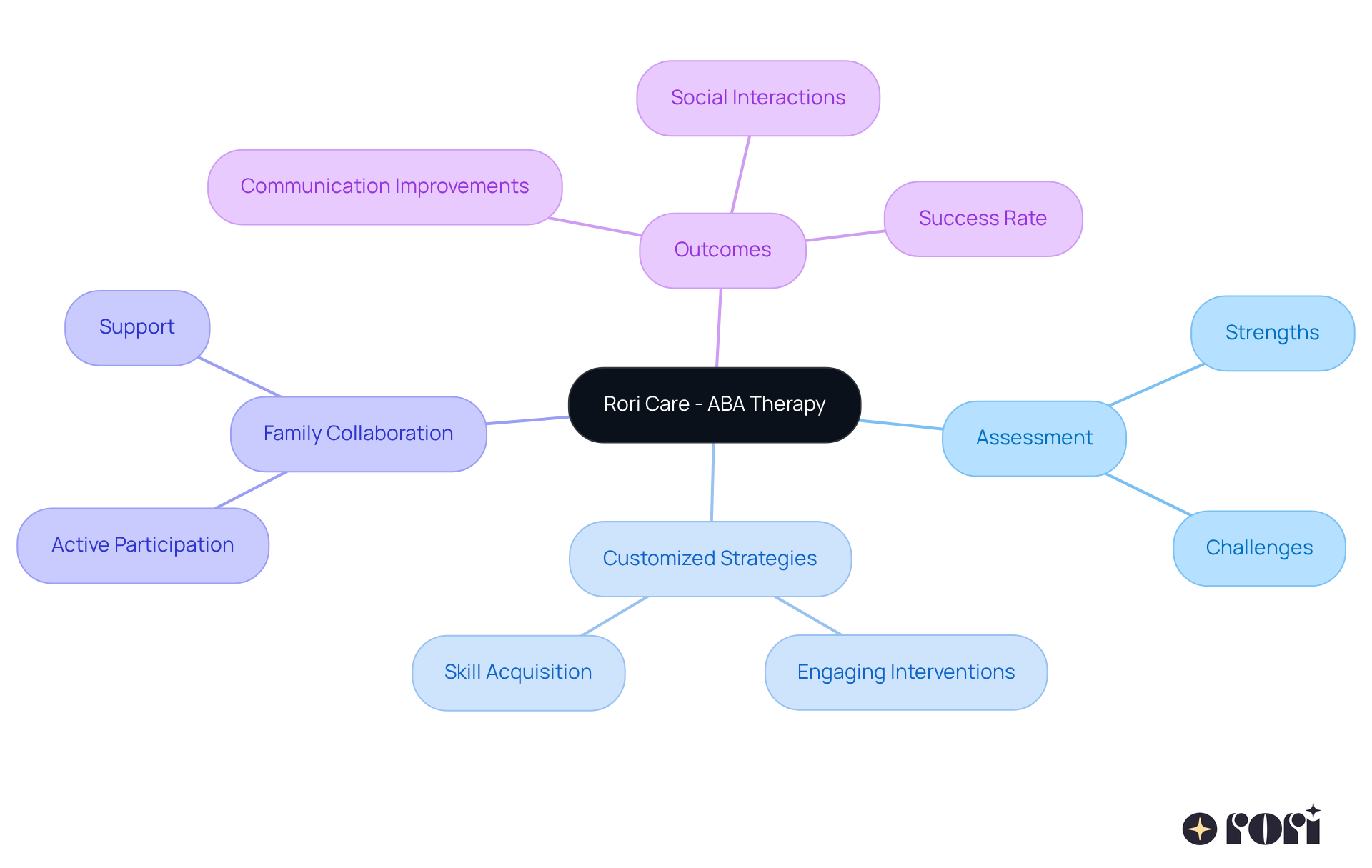
At Rori Care, we're excited to share how AI technology is changing the game in autism care! 🌟 Imagine having treatment plans that adapt to your child's unique progress and needs - sounds amazing, right? Our individualized planning includes customized autism care strategies for specific interests, ensuring that each behavioral plan is tailor-made to fit your child's strengths, challenges, and goals, providing the personalized support they deserve.
AI systems dive into behavioral data to spot patterns, which helps our skilled behavior analysts set clear, measurable objectives for behavior modification and development. This way, we ensure that interventions remain relevant and effective. Plus, with ongoing evaluations, we can make timely adjustments to therapy, ultimately enhancing the quality of care your child receives.
For instance, studies have shown that AI-driven platforms can lead to significant improvements in developmental and social skills. Many participants have experienced notable gains in language skills and social age! One specialist even mentioned how AI's ability to provide real-time feedback allows for quick changes in customized autism care strategies for specific interests, thus making care more adaptable and tailored.
This innovative approach not only simplifies the treatment process but also empowers clinicians to make informed, data-driven decisions that can significantly improve outcomes for individuals with autism. So, if you're looking for a supportive community and resources, let’s explore this together! We’re here to help you every step of the way!
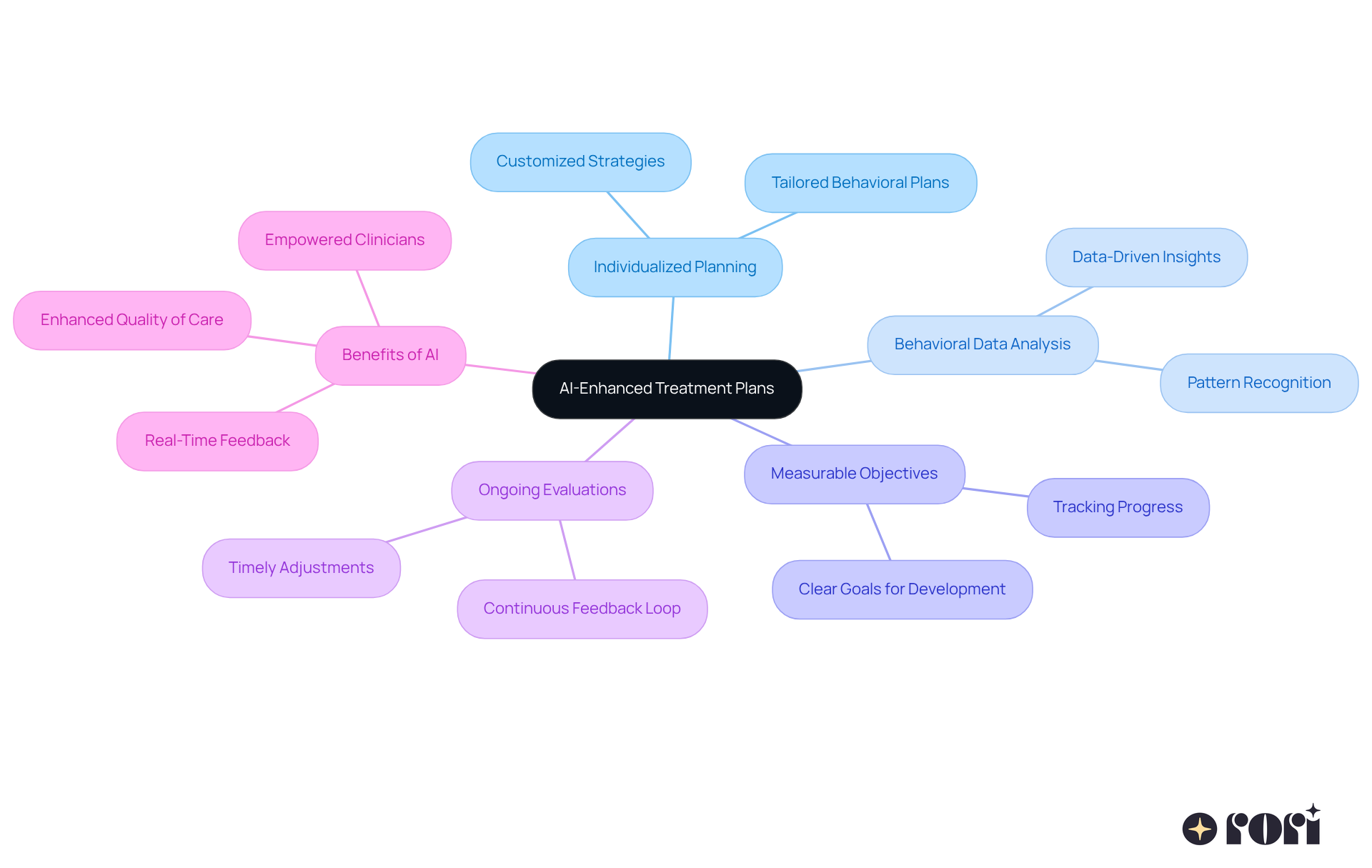
Incorporating customized autism care strategies for specific interests into therapy sessions can significantly boost engagement and motivation! When therapists use customized autism care strategies for specific interests to tailor activities that align with what truly excites the young person, it creates a welcoming environment that encourages active involvement. For instance, if a child loves dinosaurs, why not whip up some dinosaur-themed activities? This approach not only makes learning fun but also supports customized autism care strategies for specific interests, helping them connect personally with the material, making it easier to grasp and remember important skills.
Research shows that interest-based interventions can significantly enhance engagement. In fact, studies reveal notable reductions in challenging behaviors and increases in prosocial actions when young people are involved in activities they enjoy. Plus, case studies highlight that kids often show more enthusiasm for treatment when their personal interests are woven into the sessions, leading to better learning outcomes. By focusing on what captivates the young individual, therapists can create a more dynamic and responsive therapeutic environment. Let’s explore this together!
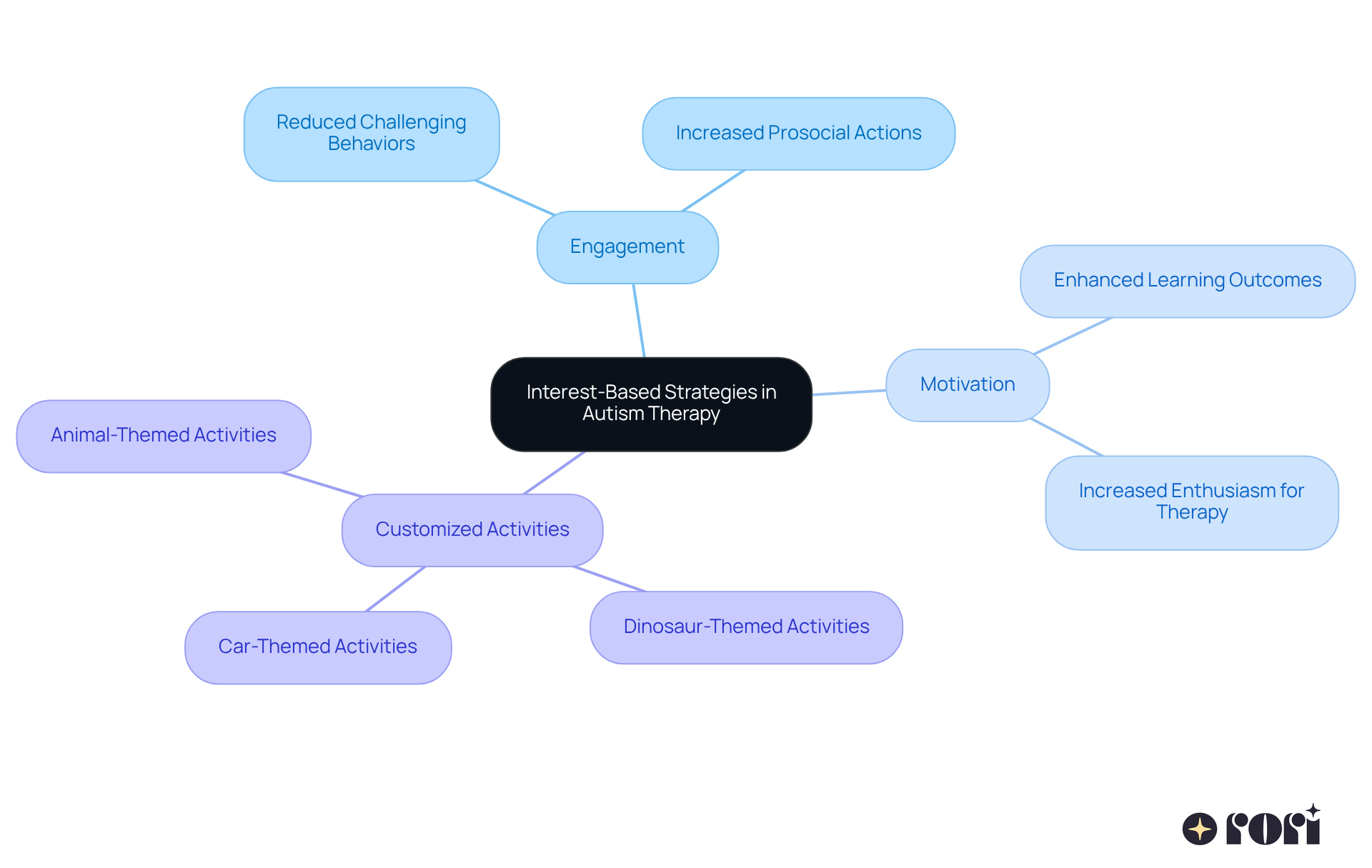
Behavior modification techniques play a vital role in autism therapy, especially through Applied Behavior Analysis (ABA). This approach really puts the child at the heart of care, making it flexible and responsive to their needs. It focuses on boosting the behaviors we want to see more of while gently reducing those we don’t. Did you know that when caregivers actively participate and follow the recommended hours, about 90% of kids show significant progress?
Common techniques like positive reinforcement, modeling, and prompting can really help encourage adaptive behaviors. For example, when a child gets a reward for completing a task, it can spark their motivation to do it again! Plus, using visual aids and clear expectations can help kids understand what’s expected of them, leading to better adherence and learning.
Early Intensive Behavioral Intervention (EIBI) is crucial for enhancing learning, verbal, and social skills in children with developmental disorders. Qualified behavior analysts are key players here, crafting personalized plans that incorporate customized autism care strategies for specific interests, along with measurable goals and evidence-based strategies.
Let’s explore this together! If you’re a parent navigating these waters, remember you’re not alone. We’re here to help you every step of the way!
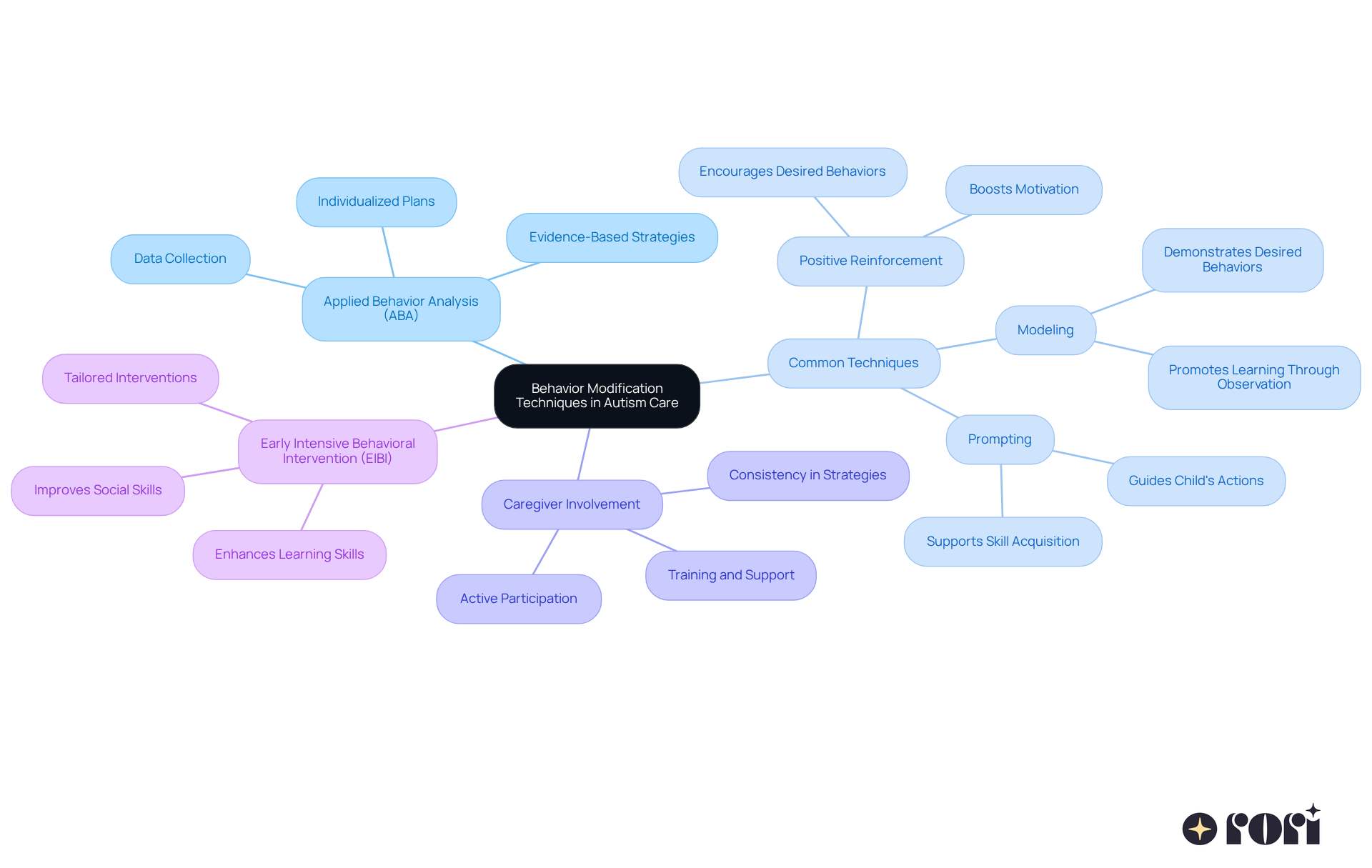
Parent-led initiatives are truly vital in the autism treatment landscape. They empower families to actively participate in their loved one's care. When parents receive training and resources, they can reinforce the skills learned during therapy sessions right at home, creating a consistent learning environment.
Research shows that parental involvement can significantly boost treatment outcomes. In fact, studies reveal that children benefit from parent-implemented interventions (PIIs), which have an average effect size of 0.553 across various developmental areas. This collaborative approach not only accelerates progress but also builds parental confidence in addressing their child's unique needs.
As parents engage more deeply in the therapeutic process, they strengthen their connections with their children, leading to improved emotional and behavioral results. Experts emphasize that when parents are actively involved, they can implement customized autism care strategies for specific interests to better fit their child's strengths. This ultimately fosters a nurturing environment that promotes growth and learning.
The knowledge and skills gained through caregiver education boost parents' confidence, enabling them to make informed choices that positively impact their child's development. According to studies published in JAMA Pediatrics, children who begin treatment within their first year show fewer signs of developmental disorders, highlighting the importance of timely intervention.
At Rori Care, we’re here to support families on this journey. We offer a range of services, including individual therapy, caregiver education, and program development. Let’s explore this together!
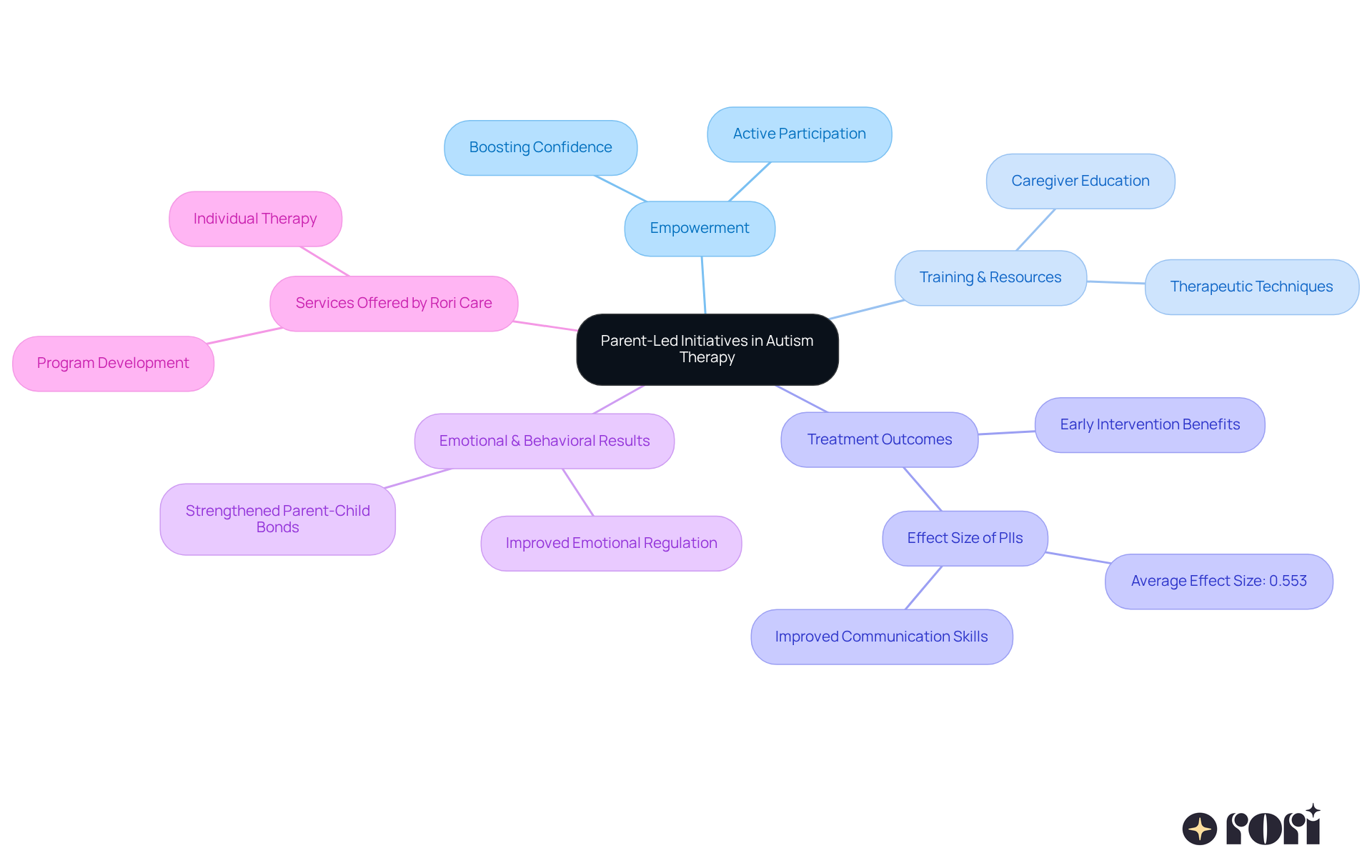
Cultivating interpersonal skills is so important for kids with autism! It helps them build meaningful relationships with their peers and boosts their overall quality of life. Some effective strategies include:
These methods teach social norms and interactions in a fun way. For instance, when kids role-play different social scenarios, they get to practice their reactions in a safe space, which really helps build their confidence and skills for real-life situations. Did you know that studies show role-playing can improve social interaction abilities by up to 40%? That’s a big win!
Including peer interactions in therapy sessions can really enhance the learning experience. It gives kids genuine opportunities to develop their social skills. Group sessions create a structured environment where they can engage in collaborative play, reinforcing essential skills like sharing, turn-taking, and effective communication. These interactions not only boost social skills but also help kids form meaningful friendships, which are crucial for their emotional and social growth.
Regular evaluations and tweaks to these approaches ensure that the treatment stays aligned with each child's development. This allows for a smooth transition from scripted dialogues to spontaneous conversations. This comprehensive approach to enhancing social skills is key to equipping kids with the tools they need to navigate social interactions effectively. Let’s explore this together!
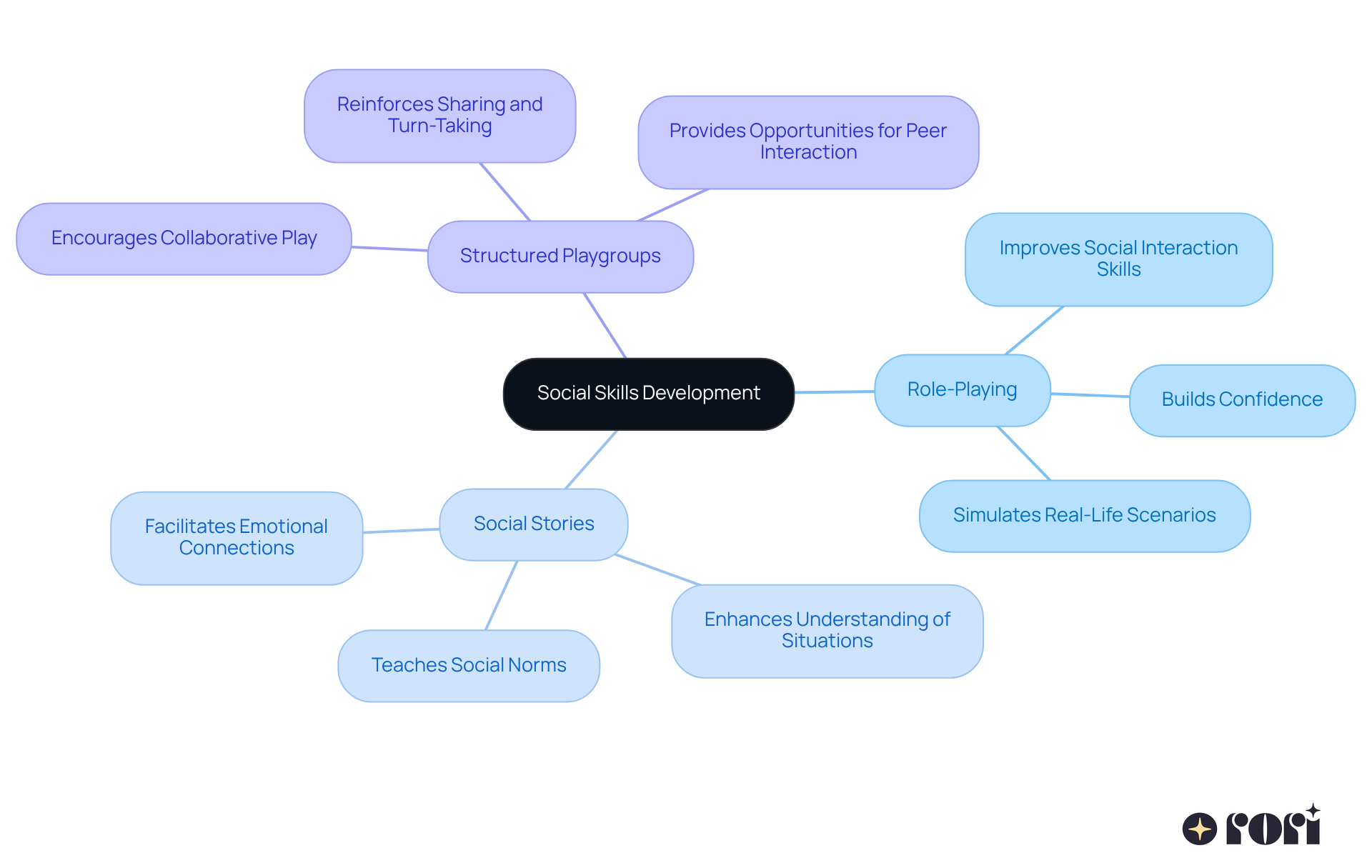
Promoting autonomy is so important in autism treatment! It helps young people gain essential daily living skills that set them up for a successful transition into adulthood. Think about personal hygiene, cooking, and money management - these are key skills that can make a big difference.
Therapists often use task analysis and incremental prompting to break down complex tasks into manageable steps. This way, young learners can progress at their own pace, which not only boosts their self-esteem but also gives them the confidence to handle daily life effectively. Research shows that focused training in everyday activities can really enhance the overall quality of life for youngsters with autism. Plus, early intervention has been linked to better outcomes in self-sufficiency!
Clinicians emphasize that customized autism care strategies for specific interests, tailored to each individual’s strengths, are crucial for keeping kids engaged and learning. As one clinician beautifully put it, "Empowering young individuals with the abilities they require to flourish nurtures a sense of autonomy that is priceless as they develop."
By prioritizing these strategies, families can really help their kids become more self-sufficient and ready to tackle the challenges of adulthood. Let’s explore this together! We’re here to help you every step of the way!
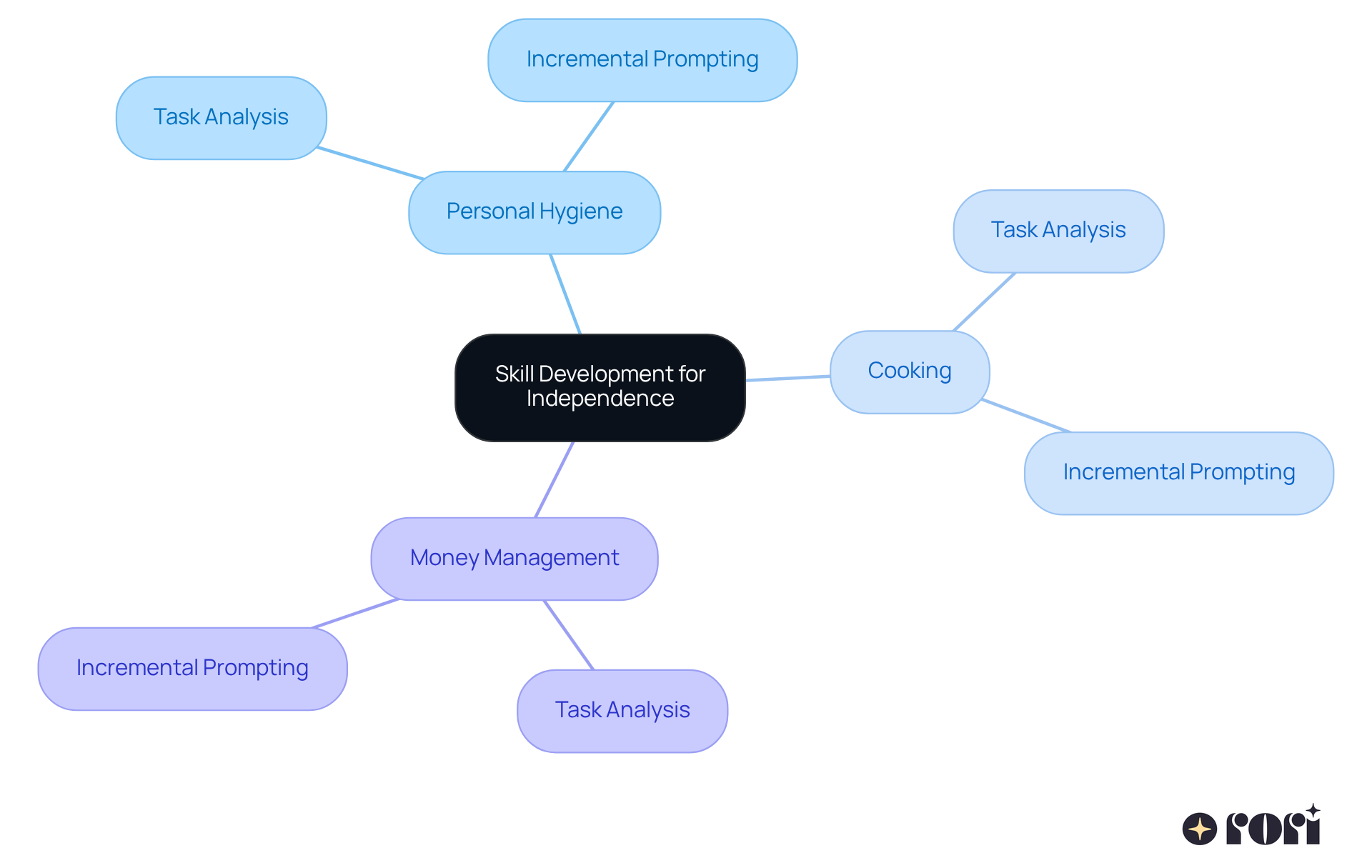
Navigating autism care can be quite a journey for families, and having the right resources makes all the difference. Tools like visual schedules, communication aids, and educational materials can really brighten up the home environment. They help foster independence and enhance daily routines, making life a bit smoother for everyone involved.
Visual aids, such as picture schedules and choice boards, are fantastic for helping young individuals express their preferences and understand what’s expected of them. This can really ease anxiety and encourage positive behavior. Research shows that using these aids consistently leads to better communication and social interactions, which is why they’re so valuable in therapy.
And let’s not forget about online platforms and community resources! They connect families with essential support networks and information, empowering them to advocate effectively for their children’s needs. When families have access to these resources, they’re better equipped to implement customized autism care strategies for specific interests at home, ultimately enhancing their child’s development and well-being.
These tools not only support a collaborative approach to treating developmental disorders but also facilitate customized autism care strategies for specific interests. It’s all about enabling parents to be engaged contributors in their child’s journey. So, let’s explore this together! We’re here to help you every step of the way!
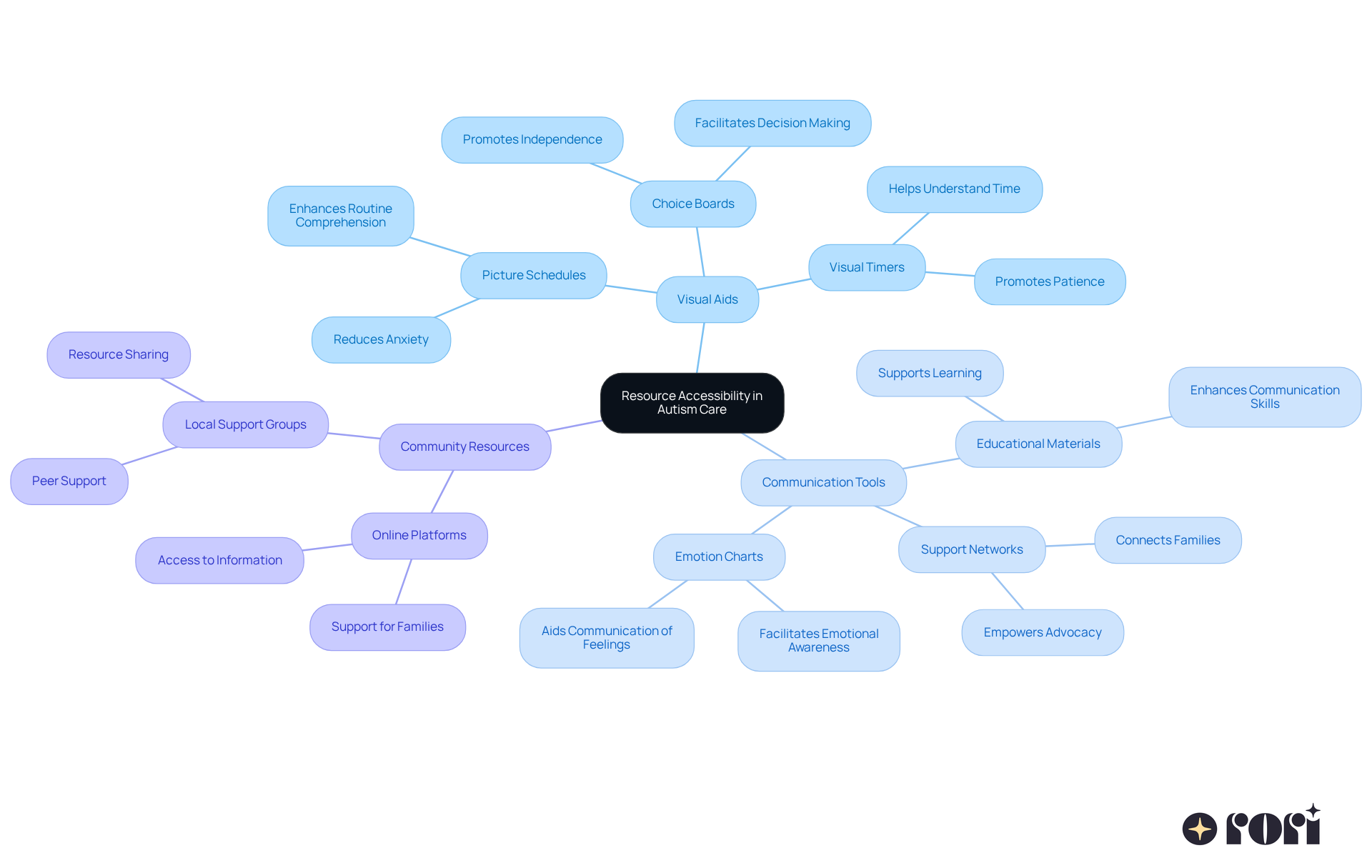
Collaborative care is so important for providing the right support for individuals with autism. It brings together a diverse team of professionals - think therapists, educators, and medical experts - all working together for your child’s benefit. At Rori Care, our amazing clinicians are here to guide your family through the journey with compassionate Applied Behavior Analysis (ABA) treatment. We make sure that each child’s unique needs are met, creating a warm and supportive environment.
This teamwork allows for sharing insights and strategies, resulting in customized autism care strategies for specific interests that are tailored just for your little one. Regular chats and joint goal-setting among team members are key. They help ensure that the interventions are not only aligned but also effective in promoting positive outcomes.
Research shows that when families get involved, the results are often better. This highlights how crucial it is to have a comprehensive strategy that looks at all aspects of a young person’s development. By empowering caregivers with ABA principles and strategies, Rori Care boosts support, informed decision-making, and better behavioral outcomes.
Our clinical leadership team is passionate about neurodiversity and the success of young individuals. We foster a collaborative atmosphere where families can tap into a wealth of resources and expertise, ultimately enhancing the effectiveness of specialized care. To support your child’s development even more, consider joining in on counseling sessions and using the resources our team provides to reinforce learning at home. Let’s explore this together!
Progress evaluation is super important in autism therapy! It helps clinicians see how well interventions are working and when to make changes. By using tools like behavioral assessments, parent feedback, and observational data, therapists can keep track of a young person's growth over time.
Regular progress evaluations not only guide treatment adjustments but also celebrate milestones, which can really boost motivation for both the individual and their family. This organized approach ensures that treatment aligns with the young person's changing needs, creating a supportive environment for growth and improvement.
Research backs this up! Studies show that individuals who receive regular evaluations make significant strides in adaptive behaviors and overall well-being. Plus, the ongoing nature of this evaluation process fine-tunes therapy, ensuring that customized autism care strategies for specific interests are tailored to each child's unique situation.
So, let’s explore this together! If you’re a parent, know that you’re not alone in this journey. We’re here to help you every step of the way!
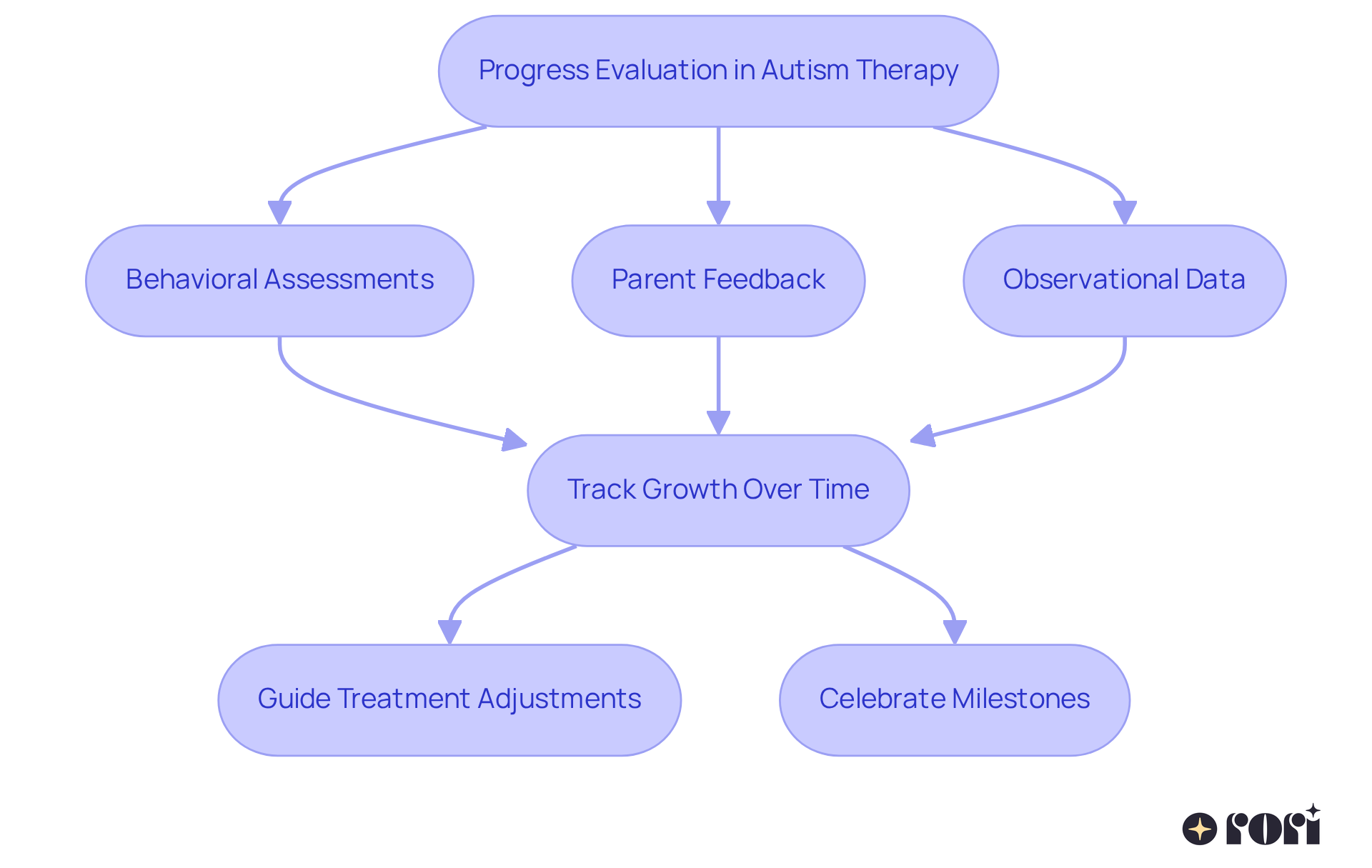
The journey of autism care can feel overwhelming at times, can’t it? But it’s truly enriched by customized strategies that align with your child’s unique interests. When families focus on personalized approaches, they create engaging and effective therapeutic environments. These spaces not only foster skill development but also boost motivation and participation. Rori Care shines in this area, showcasing how tailored interventions can make a real difference by understanding each child's strengths and challenges.
Throughout this journey, we see key strategies like:
emerge as vital components in delivering effective autism therapy. Imagine the empowerment that comes from integrating behavior modification techniques and parent-led initiatives! Families can actively contribute to their child's growth, making the process feel more connected and meaningful. Plus, with consistent progress evaluations, interventions can adapt to meet the evolving needs of each individual.
Ultimately, we can’t underestimate the significance of customized autism care strategies. By embracing a holistic and collaborative approach, families not only support their children’s development but also nurture a sense of independence and confidence that will serve them well into adulthood. So, what can you do? Engage with available resources, participate actively in the therapeutic process, and explore the wealth of strategies that can truly make a difference in the lives of children with autism. Together, let’s embark on this journey toward a brighter future - it’s not just possible, it’s achievable! 🌟
What is Rori Care's approach to autism therapy?
Rori Care uses Applied Behavior Analysis (ABA) techniques to implement customized autism care strategies tailored to each child's specific interests. This begins with a thorough assessment to identify strengths and challenges, allowing clinicians to craft focused interventions that promote positive behaviors and skill acquisition.
How does Rori Care ensure the effectiveness of its autism therapy?
Rori Care prioritizes customized strategies based on the child's interests, creating engaging treatment that fosters growth and learning. Research indicates that early and intensive ABA therapy can lead to significant improvements in communication, social interactions, and adaptive behaviors, with a success rate of over 89% in addressing autism spectrum disorder.
What is functional behavior analysis, and how is it used at Rori Care?
Functional behavior analysis is a method used to identify target behaviors and skills in children with autism. At Rori Care, it is part of a collaborative approach with families to create tailored treatment plans that support the child's development and empower parents to actively participate in their therapeutic journey.
How does AI technology enhance autism care at Rori Care?
AI technology at Rori Care adapts treatment plans to each child's unique progress and needs by analyzing behavioral data to identify patterns. This allows behavior analysts to set clear, measurable objectives and make timely adjustments to therapy, improving the quality of care.
What benefits have been observed from using AI-driven platforms in autism therapy?
Studies have shown that AI-driven platforms can lead to significant improvements in developmental and social skills, including notable gains in language skills and social age. The ability of AI to provide real-time feedback allows for quick adjustments to customized autism care strategies.
How do interest-based strategies improve engagement in therapy sessions?
Incorporating customized autism care strategies that align with a child's interests significantly boosts engagement and motivation. Activities themed around what excites the child, such as dinosaurs, create a welcoming environment that encourages active involvement and enhances learning outcomes.
What research supports the use of interest-based interventions in autism therapy?
Research indicates that interest-based interventions can lead to notable reductions in challenging behaviors and increases in prosocial actions. Case studies show that children are often more enthusiastic about treatment when their personal interests are integrated into therapy sessions.